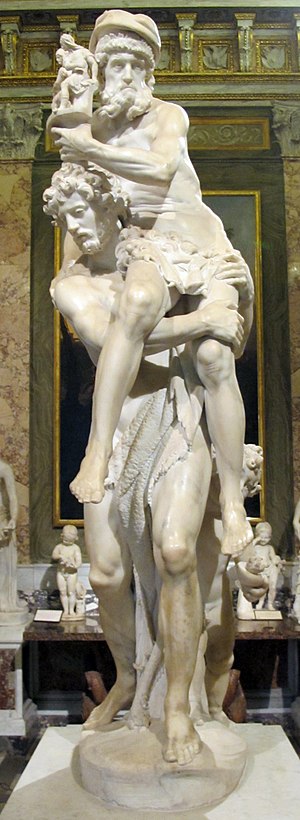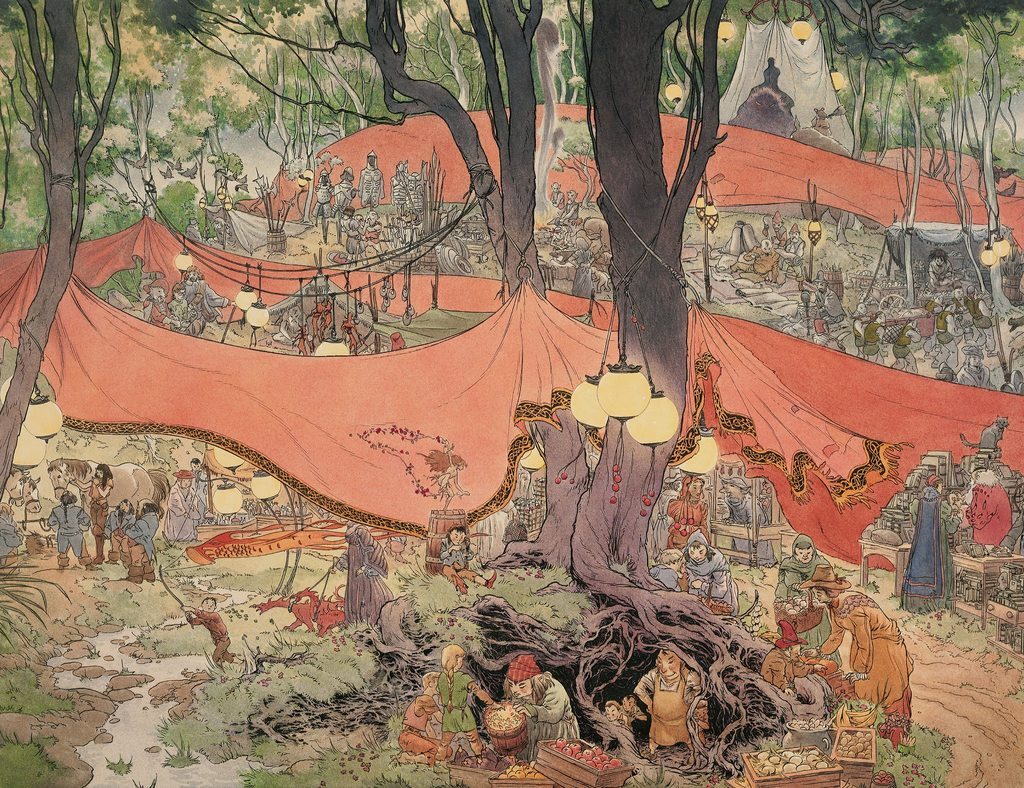The quotes below are all from Lord Dunsany's The Gods of Pegāna, because I have been making a concerted effort to read through Appendix N.
The Devout
The Devout has saving throws, hit dice, etc. etc. as a cleric.The Devout does not cast spells.
A Devout has a pool of Faith equal to his level. Faith points may be spent in the following ways.
- Lay on hands and expend a Faith point to heal 1d6 hp
- Verbally castigate an enemy while you're smiting them and spend a Faith point to deal +1d6 damage; deal an additional +1d6 damage if your enemy is a favored foe of your cult
- Drop to your knees and beg your god for aid. Spend a Faith point and roll a d6. If you roll a 5 or 6, you can perform one of the miracles of your god. If you fail, your Faith is wasted.
In my examples below, I've picked one school of magic to represent each god's miracle portfolio. Each school is taken from my favorite magical supplement, Wonder and Wickedness. This $10 supplement has given me dozens and dozens of cool ideas, really commands a great "tone" for magic, and is applicable no matter what game you're playing. It's well worth it. Go get it.
Recovering Faith
A Devout restores his Faith pool completely if he performs the appropriate rites and prayers when he rises from sleep in the morning.
A Devout regains 1 Faith point by taking a Turn to pray at his god's shrine or donating generously to his church.
When a Devout breaks one of his god's commandments, he loses Faith points commiserate to his crime.
When a Devout upholds one of his god's commandments, he gains 1 Faith point (or 2 Faith points if it was just over-the-top virtuous).
Choose a cult from the list below:
Cult of Kib, Sender of Life in all the Worlds
But the other gods said one to another, speaking with their hands: “What is it that Kib has done?”
And They said to Kib: “What are these things that move upon The Earth yet move not in circles like the Worlds, that regard like the Moon and yet they do not shine?”
And Kib said: “This is Life.”
But the gods said one to another: “If Kib has thus made beasts he will in time make Men, and will endanger the Secret of the gods.”
And Mung was jealous of the work of Kib, and sent down Death among the beasts, but could not stamp them out.
The Commandments of Kib
- Do not end the life of man or beast.
- You cannot deny healing from those who ask for it.
- Hold your teacher in the arts of healing equal to your parents. Provide aid to him and his family as you would your own.
- Willingly take acolytes into your service and teach them the ways of Kib.
- Do not administer a poison, nor suggest such a course. Similarly, do not give to a woman a pessary to cause abortion.
- Do not wield the knife or sword, as these are tools of death.
Favored foe: Undead
Miracles: Any spell from Vivimancy (W&W p.36)
Cult of Mung, Lord of all Deaths between Pegāna and the Rim
Once, as Mung went his way athwart the Earth and up and down its cities and across its plains, Mung came upon a man who was afraid when Mung said: “I am Mung!”
And Mung said: “Were the forty million years before thy coming intolerable to thee?”
And Mung said: “Not less tolerable to thee shall be the forty million years to come!”
Then Mung made against him the sign of Mung and the Life of the Man was fettered no longer with hands and feet.
The Commandments of Mung
- Do not claim that you can influence Mung. Mung is Mung. Men cannot stop him with praises or curses.
- You cannot withhold death from those who ask for it.
- When you lay an enemy low, cast lots to divine Mung's will as to whether he should live or die.
- Abstain from sex. It is better for mankind to end than to continue.
- Never be without your dagger, so that you may always make the sign of Mung when needed.
- Never harm the dead. They are greater than you.
Favored foe: Beastmen
Miracles: Any spell from Necromancy (W&W p.19)
The footfall of Roon hath been heard at evening outside the houses of men, and thenceforth comfort and abiding know them no more. Before them stretcheth travel over all the lands, long miles, and never resting between their homes and their graves — and all at the bidding of Roon.
The Commandments of Roon
- Discover new lands and build shrines to Roon in them. Map places never before mapped.
- You cannot deny your campfire to those who wish to share it.
- If you share your campfire, tell one of your stories.
- If you share your campfire, ask for a story.
- Do not stop or impede those on the road. Do not do battle on a road, for your blood will defile it.
- You cannot lie if someone asks your true name.
Favored Foe: Thieves
Miracles: Any spell from Translocation (W&W p.31)
Cult of Small Gods
These be the gods of the hearth: Pitsu, who stroketh the cat; Hobit who calms the dog; and Habaniah, the lord of glowing embers; and little Zumbiboo, the lord of dust; and old Gribaun, who sits in the heart of the fire to turn the wood to ash — all these be home gods, and live not in Pegāna and be lesser than Roon.
 |
| I love how Anchises literally carried his small gods. |
- When you enter a house, provide what aid you can there.
- You cannot deny food or shelter to those who ask for it.
- Burn incense at the shrine of small gods, so your prayers can be carried up to heaven.
- Cook at the hearth, so the small gods can smell your food and be nourished.
- Whip disobedient slaves and children.
- Give gifts to obedient slaves and children.
- Have sex joyously and often, but never take it by force.
Miracles: Any spell from Psychomancy (W&W p.24)
Analysis
I think having bullet point commandments that you can read and reread at the table is a great tool to center yourself as an actor. These are reminiscent of my religious touchstones.
I've always preferred "miracle" systems that differed meaningfully from a wizard's magic use. A magic-using class can probably accommodate a "white mage" that heals and deals with angels without it stepping on the toes of a faith-based character class. I think the utility of always having 10 "prepared spells" to be somewhat balanced by the inconsistent casting methods provided above. I also think that the GM using his privileged information to be a clever way to represent a god's supernatural insight.
Obviously, this class requires some buy-in on the part of the player. If they like pouring over magic spell lists and carefully preparing their spells per day, this class will feel erratic and unsatisfactory.














